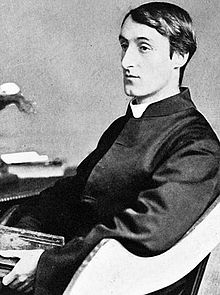We sang Paul Spier’s 1953 setting of Pied Beauty when I was in the senior choir at Sydenham High School in around 1964. We did it from memory for Speech Day and I can still hear the alto line in my head. It was my first encounter with Gerard Manley Hopkins (1844-89). What a poet!
The English department at college later introduced me to The Wreck of the Deutschland, The Windhover, Felix Randal, Binsey Poplars and more and, as a teacher of secondary English I later shared some of these with classes but I must admit I hadn’t read any of it in a long time. Then, at the beginning of this month. I heard an arresting reading of The May Magnificat on Radio 3 and it sent me scurrying to the poetry section of my bookcases ( three shelves on my upstairs landing – not sure whether I’ve ever mentioned that?).
I pulled out my old volume of Hopkins, published by Penguin in 1953 and 1985 edited by WH Gardner. It is still available but there are plenty of other editions of Hopkins’s poems. Gardner’s laboured introduction by the way, made this irreverent 2023 reader laugh aloud. It includes the most convoluted account of Hopkins’s use of metre you could possibly devise: a sort of literary Sir Humphrey. After a few sentences you want to interject “I hope you’re keeping up.”
Hopkins was an Oxford man who was attracted by the Tractarian movement and eventually converted to Catholicism and became a Jesuit priest. Most of his poetry was unpublished in his lifetime and owes its survival to the poet Robert Bridges who was a close friend.

He was fascinated by nature and his observations are sensually accurate. In his sonnet Spring he writes “weeds in wheels, shoot long and lovely and lush”. His titular windhover is “daylight’s dauphin, dapple-dawn-drawn Falcon/in his riding”. Everything that he sees, thinks or feels is rooted in his religious passion, wonder, reverence and awe. God’s Grandeur is an unforgettable sonnet which opens: “The world is charged with the grandeur of God / It will flame out, like shining from shook foil”.
His impressionistic, mould-breaking use of interwoven alliteration, assonance, consonance and rhyme anticipates Dylan Thomas (a very different sort of man) by half a century. Take for example the opening of this little poem which appears in my edition simply as number 57: “The furl of fresh-leaved dogrose down/ His cheeks the forth-and-flaunting sun / Had swarthed about with lion-brown/ Before Spring was done.” Or what about the first two lines of Duns Scotus’s Oxford?: “Towery city and branchy between towers; Cuckoo-echoing, bell swarmèd, lark charmed, rook-racked, river-rounded”.
Apparently the two religious poets Hopkins most admired were George Herbert and Christina Rossetti and I can see the influence of both clearly in his work. Indeed, the 17th century metaphysicality is definitely there but so is the contemporary Victorian awe that Rossetti does with such elegant simplicity.
Yes, “all things counter, orginal, spare, strange” are to be found in this man’s writing. I don’t share his religious belief but by golly, I admire his conviction. I also love his facility with words and his innovative depiction of the natural world.
Next week on Susan’s Bookshelves: Simon by Rosemary Sutcliff